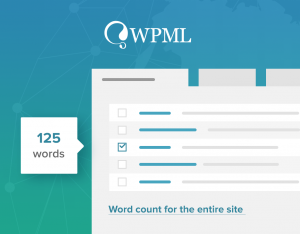No matter who’s translating your website, it’s a project. And, like any other project that you tackle, the first step should be to know the project’s size.
To create a multilingual website you need to do two things. Set up the technicalities (for which you got WPML) and translate the content.
WPML takes a few minutes to set up and requires no technical or language skills.
However, translating the site’s content can be a lot of work.
Different translators take different lengths of time to translate. Of course, translation speed depends a lot on the subject and the amount of time a translator needs to research correct terminology. As a rough average, you can assume that a good translator will be able to handle between 1500 and 5000 words in a full day (thanks to Tomedes for the great research).
But what does it mean to you?
Without the website’s word count, not much.

In some multilingual websites, you’d need to translate everything. This is especially true for smaller sites with less dynamic content. However, on very large sites which feature a lot of new content every day, not everything will go to translation.
For example, on our own WPML.org, we translate only the main pages, user documentation and account section. We don’t translate all the API and developer information and we certainly don’t translate the support forum’s threads.
But all of this is “content”, so you need to tell the word count tool what to count and what not to count.
How WPML’s Word Count Tool Works with Translation Services
The word count tool in WPML “simply” counts everything. This by itself is not a simple operation because it needs to know what’s text and what’s not text, split sentences, etc.
But WPML’s word count tool doesn’t take into account the translation memory that most translation services offer. It can’t, because each translation memory runs a slightly different algorithm.
Translation memories find texts that repeat (identically or very similarly) and translate them automatically for you. This means that you need to translate a bit less than the number of words in your site.
You can look at WPML’s word count as the “worse case” count for estimating the cost and schedule of the translation work. If a translation service uses a good translation memory, it can only reduce the figures.
Questions? Ideas? Suggestions?
Let us know if you need help with your site’s word count. Leave your questions here or create a ticket in WPML’s support forum.
